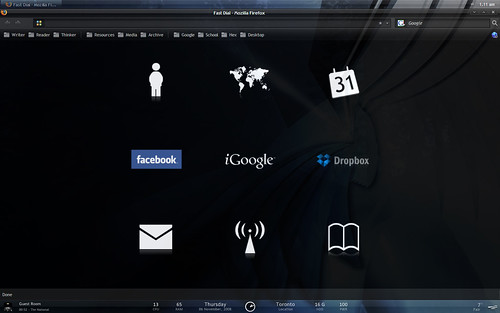MGEC, Universidad de Navarra
November 2008
We love the internet because it is free. Reading my Google Reader news feeds this morning, I came across Lifehacker's featured Firefox theme.

This minimalist black interface is too dark for me, but I've tired a few themes over the years. These themes are all generated by independent people who have a lot of creativity and a desire to share and be recognized. Mozilla Firefox's open source allows people to design and share their own add-ons. What is open source you ask? It basically means that no single person owns the intellectual property rights to all the code. Red Hat puts it this way:
All software is written with source code. With open source software, the code is protected by a special license that ensures everyone has access to that code. That means no one company can fully own it. Freedom means choice. Choice means power.All this open source stuff is part of the vastly growing Economy of Free. For a good read, see Wired's article Free! Why $0.00 Is the Future of Business. So, if it is free, where is the incentive? Who makes the money? This depends. But the underlying answer is advertising. Sometimes the goal is to get personal user information, but even this is with the end goal of selling you something. Behind "free" is the value of having a product in the hands of millions and charging somebody to put their logo or service into those hands as well.
...The perfect breeding ground for collaboration, the Internet moves ideas and code around the world in an instant.
For example, look at Mozilla. They are the producers of lots of free web software, most notably Firefox, the browser I am using now and the browser with which you are most likely navigating this blog. Where does Mozilla get money? In short, from Google, who pays them to keep their search bar and default homepage on every single Firefox download. I don't know how much Google pays, but they pay for the value they see in dominating every single search on the web. This directs millions more people's eyes to see their advertising and it increases the chance that these users will opt to make a Google Account - for such free services as Gmail, Google Reader, Picasa, Google Documents, Blogspot or Youtube. These accounts give Google more information about you. And information about WHAT YOU WANT is what drives product innovation and advertising. Anything to get you to open your wallet.
A few examples of the thousands of free services which get advertising dollars (and your precious information) are:
News (in general)
Blogger
Wordpress
Yahoo!
Web hosting (in general)
Will this trend of free stuff continue to physical things as well? Free email and free news is nice, but when do I get my free laptop? Free car? The answer is, never. But in the digital world of infinite, lossless duplication, content can become virtually free. So until laptops and cars are virtual, I'll still have to pay!